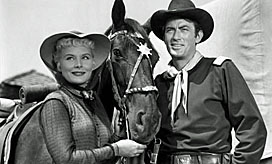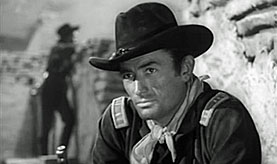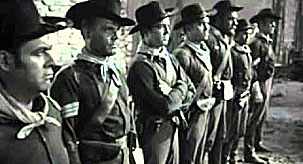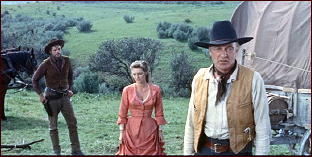Mon 14 Nov 2016
A Western Book! Movie!! Review by Dan Stumpf: DALLAS (1950).
Posted by Steve under Reviews , Western Fiction , Western movies[6] Comments
DALLAS. Warner Brothers, 1950. Gary Cooper, Ruth Roman, Raymond Massey, Leif Ericson, Steve Cochran, Barbara Payton. Written by John Twist. Directed by Stuart Heisler.
WILL F. JENKINS – Dallas. Gold Medal #126, paperback original, 1950. Adaptation of the motion picture of the same title.
Okay: for starters, I know some of you out there will be tempted to reply with a smart-ass comment about “Who shot J.R.?†I’m not naming names; you know who you are. Please remember that the TV show in question was a long time ago and you may have to explain it to the younger readers who flock to this board. Now on to the review:
Every so often Warner Brothers decided to try doing another old-fashioned big-scale Western along the lines of their big hit from 1939, Dodge City. But somehow the spirit just wasn’t there. Where Dodge City was helmed by the talented and prestigious Michael Curtiz, they gave Dallas to the erratic Stuart Heisler. The difference is palpable: where the earlier film crackles along at a lively pace, Dallas seems to lurch awkwardly from incident to incident. Some of them are competently done, but mostly they just seem a bit tired.
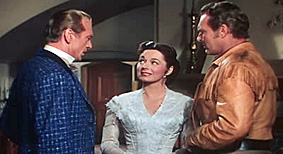
As far as the plot goes, Dallas starts out with notorious outlaw Blayde “Reb†Hollister (Gary Cooper) getting himself gunned down in the street by Wild Bill Hickok (an appropriately saturnine Red Hadley; probably the best thing in the movie) in front of the new greenhorn U.S. Marshall (Leif Erickson.)
It’s all a put-up job of course, so that Reb can get close to Will Marlowe (Raymond Massey) a major businessman in Dallas with an unsavory reputation (not unlike Bruce Cabot in Dodge City) who murdered Reb’s family years ago in Georgia.
Plot complications call for Reb to impersonate the Marshall, romance his fiancée (the alluring Ruth Roman) and generally muck about until a respectable running time is achieved and he gets his revenge. Raymond Massey does a solid job as the dress-heavy, but the script doesn’t give him much to do, and writer Twist throws in time-wasting complications, such as Erickson getting a pardon for Reb, then hiding it, then revealing it, Coop getting arrested and breaking jail, caught by bad guys, escaping from bad guys….. It could have been exciting, but it just ain’t.
Warners promoted Dallas heavily, even working out a movie tie-in paperback with Gold Medal, who wisely gave it to Will F. Jenkins, who also wrote as Murray Leinster and did fine work in either persona.
Jenkins/Leinster actually takes John Twist’s scenario and makes a better book out of it than it was a movie, starting with forty pages which ain’t even in the film, detailing how Colonel Blayde Hollister, late of the Confederate Army, was forced into outlawry to avenge the murder of his family. And when we get into the story that’s in the movie, he adds depth and complexity to the characters. The greenhorn Marshall becomes more introspective, minor townspeople acquire convincing character traits, and there’s a bit part, an outlaw’s trollop named Flo (played in the movie by the ill-fated Barbara Payton) whose resigned self-hatred suddenly becomes very real and poignant.
Dallas the book is far from a western classic, but I found myself admiring it for what a competent pulpster could bring to a hackneyed project. I can’t recommend the movie, but the book is worth your time.
